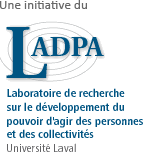Caroline Racicot, Université du Québec à Montréal
Résumé Une formation a été mise en oeuvre en octobre 2008, dans le but de permettre à des intervenantes et à des femmes vivant avec le VIH des quatre coins de la province de Québec (n=26) de se familiariser avec le programme d’intervention « Pouvoir partager/Pouvoirs partagés » d’acquérir les outils nécessaires pour l’implanter et l’animer par la suite dans leur milieu respectif. Ce programme a pour objectif d’habiliter les femmes vivant avec le VIH à faire face à la question du dévoilement (ou du non-dévoilement) de leur statut sérologique au VIH, et ce, de façon réfléchie et proactive. Afin d’évaluer les effets de la formation, les participantes ont complété un questionnaire avant et après celle-ci. Elles ont aussi participé à une plénière portant sur leur satisfaction et les apprentissages réalisés. La formation semble avoir amélioré leurs connaissances à l’égard des considérations légales liées au dévoilement de l’infection au VIH, centré leur attitude à l’égard du dévoilement sur la position soutenue par le programme et renforcé leur croyance en leur efficacité personnelle à animer et implanter ce programme dans leur organisme.
Mots-clés Femmes, VIH/sida, formation, évaluation, Québec.
Abstract In October 2008, a training was offered to community workers and women living with HIV from all over the province of Québec (n=26). This training aimed to get them familiarize with the intervention program « Pouvoir partager/Pouvoirs partagés » (PP/PP) as well as to start enable participants to run the program on their own respective milieus. The main objective of « PP/PP » is to facilitate women living with HIV’s capacity to deal with issues of disclosure (or non disclosure) of their HIV serological status, proactively and in a well thought out manner. In order to assess the effects of the training, the participants completed a questionnaire before and after the training sessions. Also, they participated in a focus group about their satisfaction and about what they learned. The training seems to have improved their knowledge of the legal aspects regarding disclosure, center their attitude towards disclosure on the position supported by the program and reinforced their perceived self efficacy in animating and implementing the program into their organization.
Keywords Womens, HIV/aids, training, evaluation, Québec |


 | 
|
| © 2025. Faculté des sciences de l'éducation, Université Laval, tous droits réservés. Site réalisé par le Centre de services et de ressources en technopédagogie. ISSN – 1918-3399 |




 Page précédente
Page précédente



 PDF]
PDF] Haut
Haut